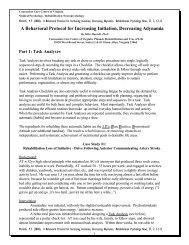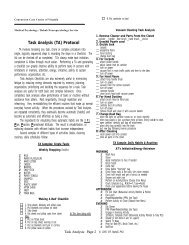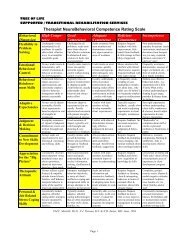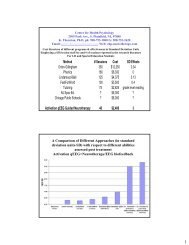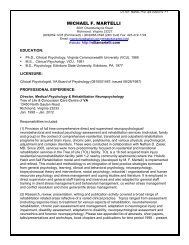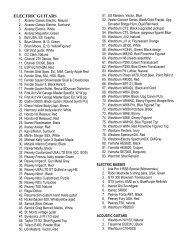Slull reacquisition after acquired brain injury - villa martelli disability ...
Slull reacquisition after acquired brain injury - villa martelli disability ...
Slull reacquisition after acquired brain injury - villa martelli disability ...
Create successful ePaper yourself
Turn your PDF publications into a flip-book with our unique Google optimized e-Paper software.
116 M.F: Marteffi et a/. /Skiff <strong>reacquisition</strong> <strong>after</strong> <strong>acquired</strong> <strong>brain</strong> <strong>injury</strong><br />
Schutz and Trainor [65] recently reviewed the status<br />
of cognitive rehabilitation as a neurorehabilitation<br />
treatment paradigm. They suggest that there has been<br />
a shift from the original meaning as a paradigm of<br />
complex, sophisticated, and integrated interventions,<br />
to more recent poorly conceptualized, compartmentalized<br />
and largely ineffectual service modalities. Based<br />
on considerable empirical support for treatment efficacy<br />
for the former "holistic" programs, they proposed a<br />
new definition. Cognitive rehabilitation is defined as<br />
a systematic, theory based program of "integrated di-<br />
4. A procedure that (a) promotes rehabilitative strat-<br />
egy use adapted to individual's neurobehavioral<br />
losses, inherent reinforcement preferences, and<br />
coping style, that is (b) reliant on naturalistic rein-<br />
forcers which (c) highlight relationships to func-<br />
tional goals, (d) utilize social networks, and (e)<br />
employs a simple and appealing cognitive attitu-<br />
dinal system and set of procedures that maximize<br />
motivation.<br />
&tic, experiential, procedural and psychosocial training<br />
aimed at restoring -cognitively cornpromised<br />
adaptation, including decrements in interpersonal<br />
and vocational participation, self-awareness and selfdetermination."<br />
ip. 546). They noted a central focus<br />
on psychosocia~emotional aspects of recovery, recognizing<br />
defective insight and consequent "dearth of adjustive<br />
motivation" as major rehabilitation obstacles.<br />
They recommended that all mediational processes, including<br />
wanting, feeling and thinking, are necessary<br />
targets - of rehabilitation. They further elaborate that<br />
well developed neurorehabilitation programs necessar-<br />
The Holistic Habit Retraining (HHR) neurorehabilitation<br />
mode1 represents a for continuing<br />
neurorehabilitation that integrates psychotherapeutic<br />
strategies with rehabilitation training as necessary<br />
ingredients for the rehabilitation process. HHR aims<br />
to reduce the complexity of conducting psychotherapy<br />
with persons with <strong>acquired</strong> neurological disorders as<br />
well as identifying and facilitating accomplishment of<br />
meaningful individual rehabilitation goals through optimal<br />
learning procedures. HHR accomplishes this by<br />
simplifying and integrating the Processes and methods<br />
of interdependent goal accomplishment in ps~chotherapy<br />
& rehabilitation. At the heart of this model is the deily<br />
do the following: (a) combine systematic treatment sign and presentation of practical, utilitarian strategies<br />
of cognitivehehavioral deficiencies with psychothera- for retraining adaptive cognitive, emotional, behavioral<br />
py and milieu therapy; (b) address many different im- and social skills. This includes strategies for overcompairments<br />
and disabilities, and; (c) strive to supportpar- ing common obstacles to utilizing methods that proticipation,<br />
independence and self managed adaptation<br />
to all aspects of life through use of adaptive strategies<br />
that represent durable adaptive systems that are used in<br />
mote effective habit acquisition.<br />
the real world.<br />
2. Rehabilitation and the Holistic Habit Retraining<br />
In the present paper, a model of holistic neurorehabilitation<br />
that addresses persisting <strong>brain</strong> <strong>injury</strong> seque-<br />
(HHR) model: Rehabilitation is relearning<br />
lae and disablement is examined, along with illustrative Rehabilitation is the Systematic Process of Removing<br />
methodology. This model conceptualizes many <strong>brain</strong><br />
<strong>injury</strong> sequelae in terms of disruption of previously<br />
established hierarchical and interdependent habits that<br />
underlie all efficient, adaptive living skills. The Holistic<br />
Habit Retraining (HHR) model and methodology<br />
of neurorehabilitation [32,35-37,39,40,42,44] is based<br />
upon the following:<br />
Obstacles to Independence & Accessing Opportunities<br />
for Achievements of Desired Goals in the areas of love,<br />
Work and Play! The Purpose of Rehabilitation is to<br />
Change Fate!<br />
- M.E Martelli, PhD & the Obstacle Busters ABI<br />
Cope Group, circa 1994 -<br />
1. The "automatic learning" and "errorless learning" Adaptive behavior is reliant on intact central nervous<br />
literature and evidence supporting efficacy of this system (CNS) function. The ability to learn and store<br />
methodology for skills relearning <strong>after</strong> <strong>brain</strong> in- information and execute tasks related to that behavior<br />
jury [261;<br />
is dependent on intact <strong>brain</strong> cells. Damage to <strong>brain</strong><br />
2. A task analytic examination of acquisition of rele- cells that occurs in <strong>acquired</strong> <strong>brain</strong> <strong>injury</strong> (ABI) can divant<br />
behavioral habits as a model for constructing minish or delete the stored knowledge and adaptive beskills<br />
retraining protocols;<br />
havioral habits that sustain important human abilities.<br />
3. Analysis of organic, reactive, developmental, and Despite the fact that damage to <strong>brain</strong> cells can impair<br />
characterologic obstacles and facilitators of strat- adaptive behavior and habits, the ability to reorganize<br />
egy utilization; and<br />
and support re-learning is seldom erased 1161.



